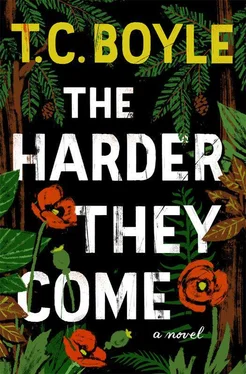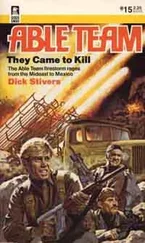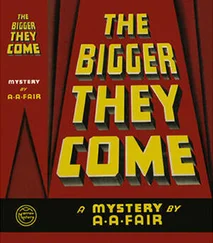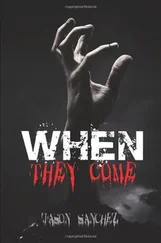Last to board was the driver, who removed his dark glasses to squint down the length of the bus, counting heads, and then, bending awkwardly to dig under the seat — he had a belly, Sten saw now, the belly of a man who sat for a living — he produced a neon-orange rain slicker, unfurling it with a flourish to make sure everybody was watching. Was he going to drape it over the man’s face? Was that it then, was it all over, forget the charade? But no, he folded the slicker into a makeshift pillow, plumped it two or three times, then bent again, all the way down now, and slipped it under the man’s head. No one said a word. Flies buzzed. Sten’s throat was so dry he couldn’t swallow, and yet he didn’t reach for Carolee’s water bottle because he didn’t want to call attention to himself — or any more attention, that is.
For a moment — too long, because this was an emergency, wasn’t it? — the driver simply stood there looking down on his handiwork, shaking his head slowly. Did he know the man? Had they been in collusion? It was hard to judge from his expression, but when he sank into his seat and pulled the door closed, he shot a withering look down the aisle and repeated his mantra—“You sit”—though everybody was already seated. Incredibly, he was glaring, actually glaring at them, no mistaking the severity of that look, the reprobation, the censure, as if they’d all gone so far beyond the bounds of propriety it wasn’t worth mentioning, as if they were in fact children and had behaved badly, as if they hadn’t been attacked and he hadn’t been in on it or at least complicit. Sten was sure he was. Lure the tourists out here in the middle of nowhere, call the gang, split the proceeds, what could be simpler? The man — the driver, the hypocrite — held that look a beat, then he fished out his sunglasses, and as if performing a delicate operation, fitted them carefully over his ears, adding superfluously, “We go now.”
When they reached the outskirts of the city and the harbor came into view, the bus swung off the main road and hurtled down a series of surface streets, one careening turn after another, until suddenly, without warning, right in the middle of a nondescript block of tiendas, market stalls and apartments, the driver hit the brakes hard, and they lurched to a stop in front of a low concrete-block building that might have been a warehouse or machine shop but for the Red Cross emblem over the door. Caught off guard, Sten was violently pitched forward, and if he hadn’t been holding on to Carolee — protecting her — he might have slammed face-first into the seatback in front of him. As it was, he just managed to tuck his shoulder and soften the blow as the chassis recoiled and a rain of purses, cameras and water bottles spilled from the overhead racks and skittered across the floor, seeking equilibrium. The paramedic wasn’t as fortunate. All this time he’d been on the edge of his seat, leaning over the gunman and bracing him against the bumps and dips and wild looping turns, but he lost his grip at the final moment and the body rucked forward, sliding partially down the stairwell and shedding the rain slicker in the process.
People looked to Sten, as if it was his responsibility, but he was having none of it. It was the paramedic’s problem now — he’d taken it upon himself, hadn’t he? He was the professional. Let him deal with it. For one stunned instant, people just stared, and then, cursing, the paramedic — short, square-shouldered, too heavy in the butt and with a face as round as the moon — sprang up out of his seat to wedge himself in the stairwell and prop up the man’s head, but he was clearly having trouble, the body having come to rest on one shoulder, canting the neck at a spastic angle. “Give me a hand here, will you, somebody?” he gasped, but nobody moved, or at least not expeditiously enough — they were old, all of them, old people — so he slid his hands in under the man’s arms, cradling his head as best he could, and began easing him down the steps.
At this point, Bill — the other Bill, the one with hair — pushed himself up to help, ducking into the stairwell in a shuffling stoop to catch hold of the patient’s feet at the door, but at the last second they slipped from his grasp, flopping down on the hot pavement like fish on a stringer. The sound of it was nothing, barely audible, the small dull thump of dissociated flesh striking an unyielding surface, but it reverberated through the bus like a thunderclap. Sten could feel Carolee tense beside him. Nobody breathed.
The paramedic — he’d seen worse — just seemed to shrug it off, dragging his patient up over the curb even as Bill, fumbling forward, managed to take hold of the abraded heels and lift them from the pavement. “Set him down,” they heard the paramedic say. “No, not in the dirt — right here, right on the walk.” Awkwardly, in a stoop that had him bent over double, Bill swung the man’s legs into alignment as the paramedic eased him down — waist, shoulders, one hand to protect the head, easy does it, and there was their collective burden, harmless enough now, laid out on his back like a sunbather on a glittering gum-spotted beach. Satisfied, the paramedic straightened up and threw a quick glance at the bus before hurrying up the walk and disappearing into the building, leaving Bill there to stand watch.
That was the scene: the man called Bill, skinny, sunburned, his shoulders slumped and his waxen hair flattened to his head as if it had been dripped in place one hot strand at a time, standing there over the man who wasn’t breathing and whose throat was discolored under the point of his up-thrust chin — dark there, too dark, as if he’d decided to grow a goatee after all. Bill shifted in place, put his hands on his hips, dropped them. There was a smell of the sea, tepid and redolent of small deaths. Someone was revving a motorbike in the alley next to the clinic. A car rolled slowly up the street, its windshield molten under the sun.
And then the paramedic (his name was Oscar, Sten would later learn, Oscar Ruiz, of Oakland, California, sixty-two years old and in his first month of retirement) emerged from the building, an attendant in pale green scrubs hustling along beside him, pushing a gurney. Everyone leaned forward to watch as the attendant bent to the motionless form, checking for vital signs — futilely, as far as Sten could see, though one woman kept insisting there was no reason to give up hope because the electroshock machine, the defibrillator, was a real miracle and it had saved her husband, twice . “The guy’s gone, can’t you see that?” the man behind her put in, and a whole sotto voce debate started up. Sten ignored it. He sat there with the rest of them, sweating, thirsty, wanting only to be back on the ship. The police would be coming now, he knew that. At the very least he’d be required to give a statement, they all would. But what then? Would they charge him? Would he and Carolee have to stay here in this reeking excuse for a city for days on end — weeks, even — while all the others climbed back aboard the ship and cruised away into the sunset?
His eyes shot to the driver. The man had swung his legs out into the aisle to get comfortable. He had a cellphone to his ear now, speaking his whipcrack Spanish into the receiver, and who was he contacting if not the authorities? Sten looked to Carolee and she breathed his name, twice, in a kind of moan: “Oh, Sten, Sten.” She fidgeted in the seat, and whether consciously or not, she pulled her hand away from his and rubbed her palm, the moisture there, on her shorts. She spoke in a whisper: “You think they’ll let us go back now?”
He shrugged. He wasn’t exactly in a talkative mood. All he felt was tired. Sleep, that was what he wanted, another realm, a way out of this. He watched dispassionately as the paramedic helped the attendant load the limp body onto the gurney and wheel it up the walk and into the yawning double doors of the clinic. Everybody saw it, the retreating feet, the wheels of the gurney, the doors snapping shut like a set of jaws, and as if at a signal, people began stirring. Here came Bill, the good Samaritan, to lead it off, mounting the steps of the bus and sliding into the front seat beside his wife. A man Sten couldn’t place stood and started sorting through the daypack he’d stowed overhead. There was a rustle of bags and papers, as if a stiff internal wind had started up to whip through the bus. Bottles of water appeared. Power bars. Cellphones. The unpleasantness was over now and it was as if nothing had happened: they were tourists deprived of a nature walk and thinking only to get back to the boat, to their cabins and staterooms, to privacy, air-conditioning, cocktails, dinner at the captain’s table. They’d had an experience, all right, something to text home about, but it was over now.
Читать дальше












